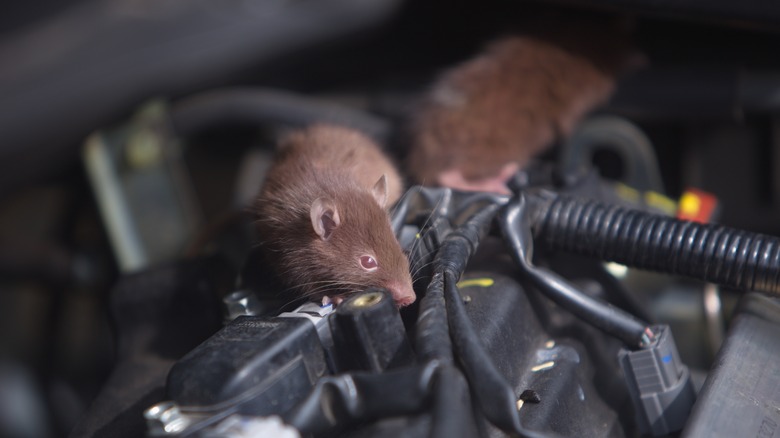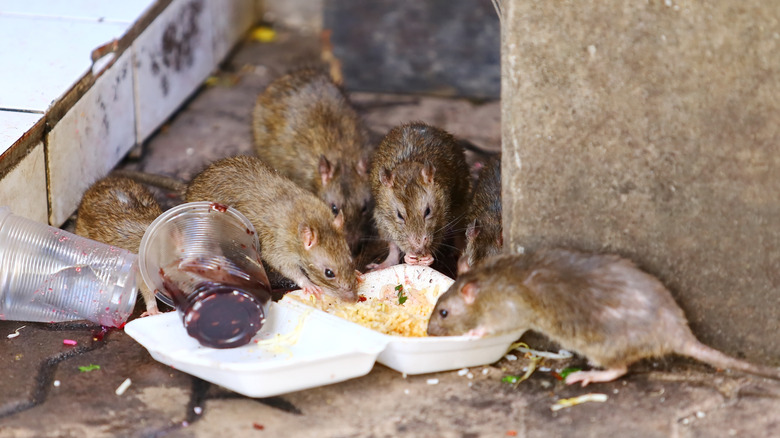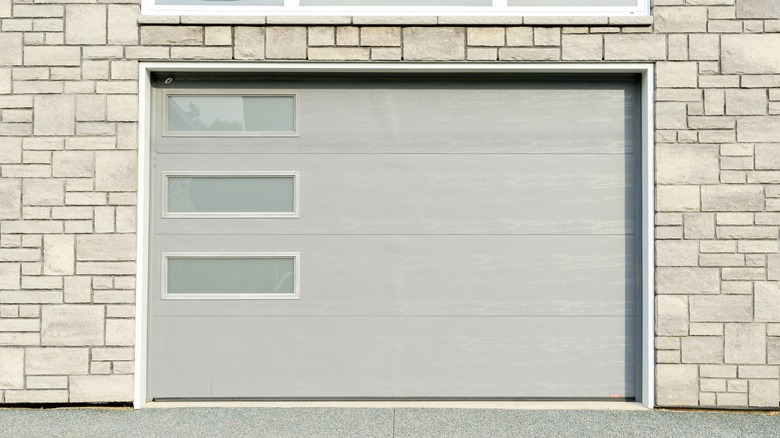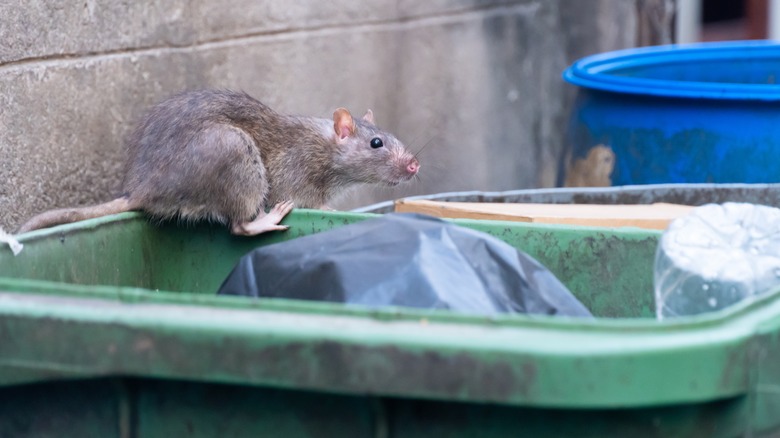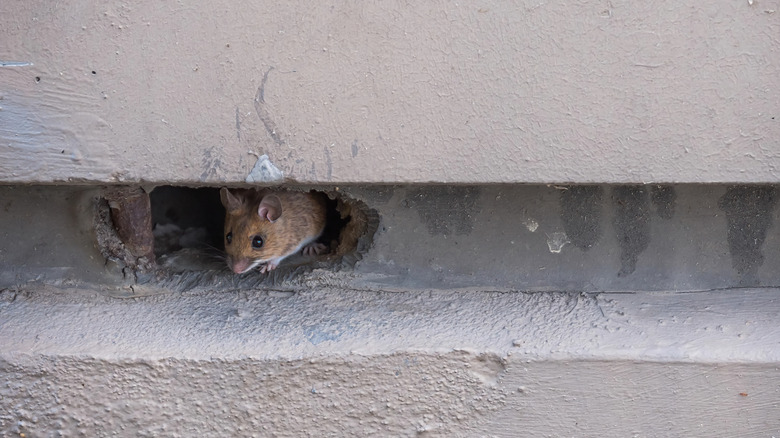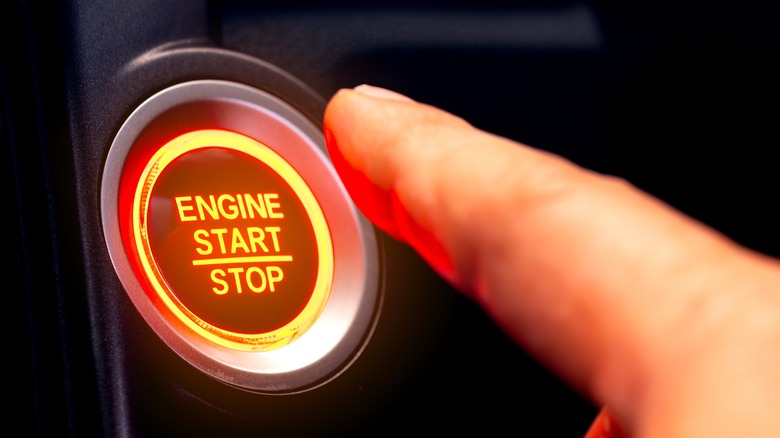6 Ways To Repel Rodents From Making Your Car's Engine Their Home
Pests come in all shapes and sizes, but none quite make our skin crawl like rodents — a group of mammals that includes rats, mice, squirrels, and chipmunks, that are characterized by their continuously growing set of teeth that must be regularly worn down by chewing and gnawing. Wherever mankind reigns supreme, you can bet that swarms of these critters are nearby. Having readily adapted to life alongside humans, many rodents can be pests, raiding our homes, farms, and businesses with devastating results. And if you think your car is safe from these mini marauders, think again.
Our vehicles provide the space, comfort, and safety rodents need to nest and breed, especially during the coldest times of year. Rodents can cause extreme damage to your car, as they'll be chewing on wires and pipes to keep their teeth in check, leading to expensive and potentially life-threatening electrical problems. Likewise, any stored food or nest material gathered can plug up ducts. Worst of all, rodents can carry harmful diseases and pests that will have a damaged engine be the least of your worries.
Ultimately, the best measure to keep your car free of rodents is to stop them from entering in the first place. Thankfully, doing so mainly requires some careful attention and reworking of certain habits. It's never a bad time to load up on prevention tips, so here are six ways to repel rodents from nesting in your car engine.
Keep your car clean of food and clutter
Rats and mice don't hold cars to the same standards that we do. Whether you're driving a 20-year-old Honda Accord or the hottest new Tesla doesn't matter to them. Rather, rodents are attracted to wherever will keep them and their young safest and is close to a constant source of food. Our cars can be just that and then some.
It's easy for wrappers, containers, bags, and bits of food to accumulate on our seats and floors, and to the sensitive noses of a rodent, it's practically a dinner bell. Rats and mice are omnivorous, meaning they'll eat practically anything and everything that we do, but even seemingly inedible items such as paper can be on the menu. So if your car is experiencing a rodent problem, it's wise to remove your license and registration information as well. Similarly, having a car or trunk full to the brim with junk offers rodents the perfect place to hide and stay warm. In general, if you haven't checked your car floors in a while for trash, now's a good time as any to give your vehicle a good sweep.
Better yet, you can make maintaining your car's cleanliness into a regular habit. When going about regular cleaning activities at home, take the extra time to go into your car and give it a thorough vacuuming. It's also a good idea to avoid eating or storing food in the car for long periods of time, further avoiding the chance of unnecessary mess.
Park in your garage
Rodents aren't going to be able to access your car while it's in motion. Instead, they lay in wait for your car to be parked before making their way under your hood. Putting a barrier between outside vermin and your parked vehicle will go a long way toward ensuring its safety. The best way to do this is to keep your car parked indoors.
For those with access to one, it's worthwhile to keep your car safely parked inside a storage area, such as a garage. This keeps your car out of sight and scent of any little critters, but also comes with plenty of other benefits for the car itself. Keeping your car in a garage is a great way to protect it from the elements, especially during the cold months where rain, ice, and snowfall can be especially harsh. Likewise, the various fluids that power your car, such as oil, antifreeze, brake and transmission fluid, can thicken as the weather gets colder, putting your engine at further risk. And the time taken to warm up your car in the morning is also cut down significantly by keeping it in a more controlled environment.
Your garage will do little to safeguard against rodents, however, if it isn't clean and well-organized. For further protection, ensure your garage isn't packed with food, is cleaned regularly, and has no openings larger than 5mm that a rodent can squeeze through (more on that later). Of course, not everyone has a garage, which is where our next step comes in.
Be careful where you park
In a perfect world, we would all have a garage to keep our cars in and away from rodents. But that's not the case, whether you're living somewhere without one or your garage already has one car too many to fit in yours. Despite this, it's still entirely possible to keep rodents away from your car, so long as you exercise some extra caution.
Once more, the biggest thing to keep in mind with rodents is that food and hiding places are their biggest attractors. With this in mind, it's easy to spot areas where you should avoid parking your car nearby. Keep your car as far away from any grassy areas, outdoor trash cans, dumpsters, gardens, pet feeding areas, or food composts. If it's hard to move your car away from such attractors, see what you can do to move the attractors themselves.
At the end of the day, your goal is to place as much distance as possible between the cozy underside of your car and the common places that rodents may be hanging out. Most rodents typically don't travel much further than 300 feet from their home to gather food and nesting material. So while a bold rat may not hesitate to run across an empty parking lot to check out your car, it may not take up residency if it has to travel too far to forage.
Keep entrances sealed
It's no secret that many rodents, especially the ones that commonly cohabit with humans, are small creatures. But even then, you may be surprised to learn just how capable these critters are at entering spaces unnoticed. Mice, depending on their size and age, can fit through an opening as small as 6mm, which is about the same diameter as an average pencil. And thanks to the powerful teeth of rodents, some of which can chew through wood, plastic, drywall, soft metals, and even cement, it's not hard for them to make small holes into bigger ones if need be.
So when it comes to keeping them out of your car, we mean it when we say to batten down the hatches. Avoid leaving your doors, windows, or sunroof cracked open at anytime. If your car is inside a garage, be sure to rodent-proof it to the best of your abilities. Thoroughly investigate the garage itself. Is the door closed properly? Are there any holes in the wall or corners you weren't aware of? Do you have windows that won't close all the way? Any pipes that connect to the outside world that could provide access? Any and all gaps such as these should be addressed and sealed tightly right away.
Make lots of noise
How would you like it if the home you made for yourself was constantly bombarded by a loud, shaking mechanism that moved you from place to place with no warning? After pulling all your hair out, you'd probably be heading for the hills. Rodents aren't so different when it comes to their living space, which is good to keep in mind if you're trying to get rid of some pesky pests.
If rodents are taking residency in your ride, you could get into the habit of starting the engine throughout the day. Make it even more unpleasant for them by making loud noises such as honking the horn and loudly playing the radio. Doing this on a frequent basis would be upsetting enough for a person, but even worse for a rat with ultra-sensitive hearing living inside your car.
However, if you have sensitive neighbors or sleeping babies, it's easy to see where this tactic can have its drawbacks. In such a case, there are quality tools you can invest in that will aid in your dilemma. Numerous repellents exist that can emit irritating ultrasonic, low-frequency sounds that only rodents only can hear.
Use sprays and fragrances
Perhaps the sense that matters more to a rodent than its hearing is its sense of smell. In fact, some studies even suggest that rats can detect the specific smell of tuberculosis and land mines. It was more than likely that same sensitive nose that led them to your car, especially if food was nearby. But that same strong sense of smell can also be used against a rodent if you know what ticks them off.
While there are plenty of rodent-specific products you can find that they will hate to smell, you more than likely have a suitable solution in your cabinet right now. The strong scent from cayenne pepper, peppermint oil, eucalyptus oil, citrus, cedar shavings, strong body soaps, mothballs, and dryer sheets, among many others odors, can help keep rodents at bay. Just be sure to regularly reapply these smells around your car throughout the day to avoid the scent going stale.
If you can pinpoint the areas that rodents are chewing on, there are additional deterrents you can try out. A special rodent tape made by Honda is doped with capsaicin, the active ingredient in chili peppers, and gives your vehicle's wires an overwhelmingly pungent taste to deter any gnawing rodents. While not always a perfect method, it's worth using in tandem with other sense-specific tactics to keep rodents away.
